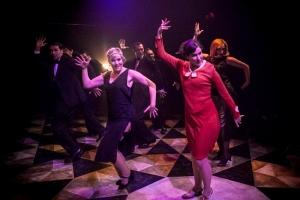Grand Hotel - Southwark Playhouse 2015
The main difficulty with the overly ambitious musical 'Grand Hotel' has always been the issue of style over substance. Tommy Tune's infamous original Broadway production, repeated unsuccessfully at the vast Dominion Theatre in 1992, was over choreographed and constantly in motion, meaning audiences didn't get too much of a chance to linger over the undeveloped plot lines and conflicting narratives.
The show has previously undergone the small-scale revival treatment at the Donmar Warehouse, and arrives at the Southwark in a stylish and finely sung revival that captures the crowded essence of the Grand Hotel Berlin, succeeding in the larger moments where broad brush strokes help paint the brightest picture.
Thom Southerland is one of our finest young directors of musical theatre, and he once again shows his skill at delivering a quality production paired with producer Danielle Tarento. The traverse staging gives a refreshing edge to the material but can grow tiresome as the cast complete mini marathons during each scene, and smaller moments are sometimes lost in the constant movement that on occasion feels like a tennis court. Parallel scenes are handled particularly well, with much attention given to the relations between the seemingly unconnected situations, but the stand out moments are those which include Lee Proud's lively choreography.
I enjoyed the kaleidoscopic nature of the book that presents snapshots rather than developments, as though we're stuck in a constant revolving door with just the odd peak into a selection of the rooms. Tune has compared the show to more of a 'concept' musical than one with a linear narrative, and the show fairs best when that idea is pushed to the forefront.
Some may feel frustrated by the lack of character development, especially when not one of these characters is likeable. Cliché is piled upon cliché - from the faded Ballerina, the Baron turned cat burglar and the typist who dreams of Hollywood, with supporting characters so roughly sketched you barely catch their names.
The weakest moments come from the 'Upstairs-Downstairs' aspect of the plot, as we're haphazardly reminded that amongst the splendour "some have, some have not", and whilst Germany basks in the glow of the Weimer Republic, we're on the eve of the Wall Street crash and change is just around the corner.
It's this aspect that Southerland has chosen to focus on, which is reason enough to explore but suffocates the overall effect of the show as a snapshot of time. The re-structured ending as a result feels forced and out of sync with the material. This is a show that is so firmly rooted in the present - we see each of the characters at a very specific moment with little information about their past - that ending so far in the future seems to miss the point.
For a show that history (namely Forbidden Broadway's perfect satire 'Grim Hotel') has mocked for its overuse of chairs, their use in this production almost parodies itself, borrowing from a number of other recent fringe productions, albeit very well. This results in a constant search for a 'coup de théâtre' rather than one naturally arriving and this feel too self conscious, overturning some of the brilliance preceding it. True - each of the sketched characters end with little hope, but the main character of the Grand Hotel itself should remain a constant, and as the door revolves and "life goes on" the message of the show, to me anyway, goes against this new ending entirely.
If the main fault of the score is that it feels disjointed, that's because it is. The musical has all the trademarks of a show in trouble, with two sets of songwriters delivering material throughout. The bleak melodies of Robert Wright and George Forrest jar constantly with Yeston's attempts at popular ballads, the most obvious of which, "Love Can't Happen" feels utterly derivative and out of context.
The cast are largely excellent with the smaller parts, in particular Jonathan Stewart being given enough space to be noticed. There is something a little too self satisfying in Scott Garnham's Baron which, despite being perfectly sung, prevents you from investing in his situation and outcome - which again has had every last drop of symbolism rung out of it in a somewhat baffling "Roses at the Station". George Rae's dying Otto Kringelein is affecting and perfectly judged, but there's a lack of charm and charisma from Victoria Serra's Flaemmchen and you never get that glimpse of Hollywood dazzle.
As we've come to expect from Danielle Tarento this is a handsomely produced revival, with stunning costume design by Lee Newby. The band led by conductor Michael Bradley were exceptionally tight, supported by the best sound design (Andrew Johnson) I've heard in that venue - what a difference it makes to be able to hear every line, even in the challenging traverse. Other producers take note.
Despite my reservations this is a rare chance to see this important, yet challenging musical up close and personal, with an impressive ensemble cast and superb production values, which continues to raise the bar of musicals on the London fringe, and it is imperative that this effort is supported.
(Dom O'Hanlon)
Originally published on
